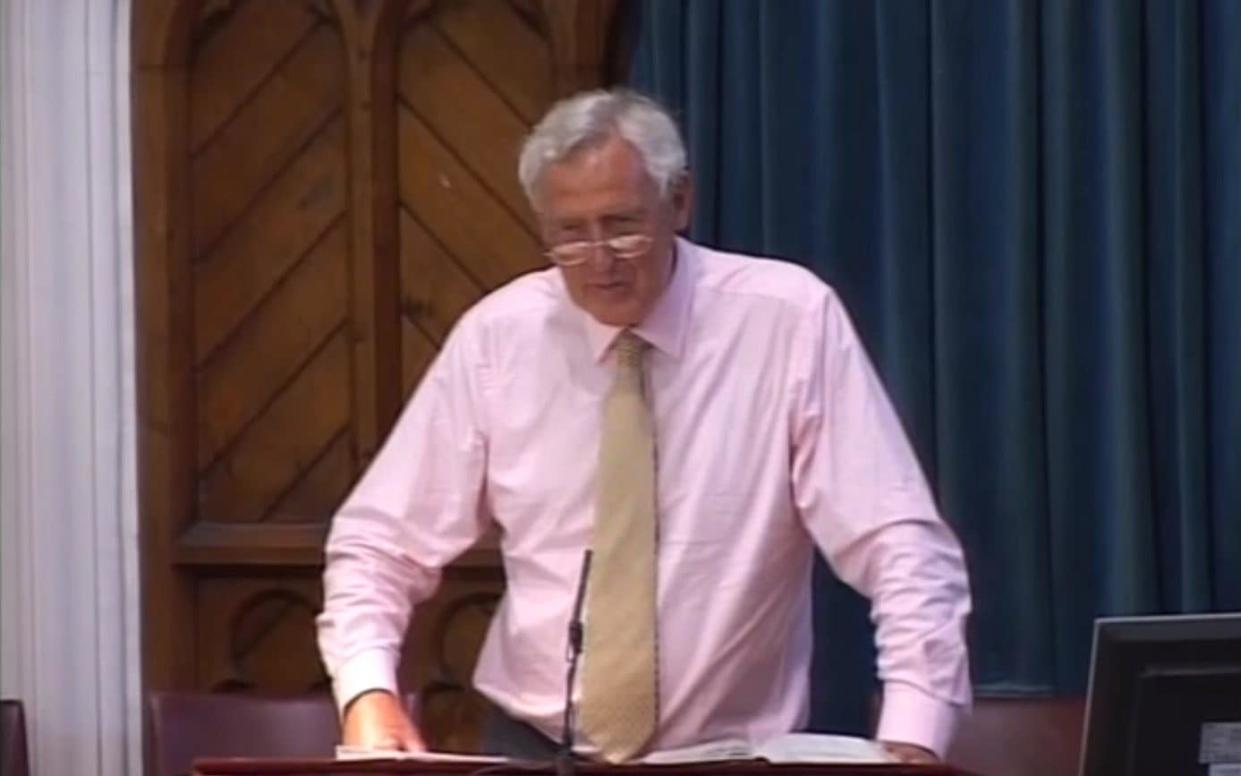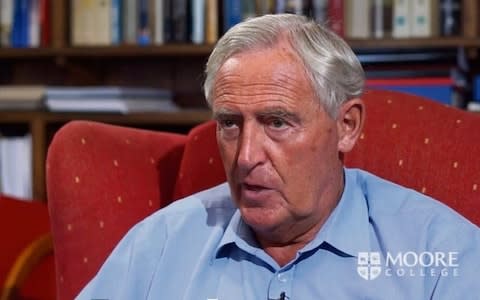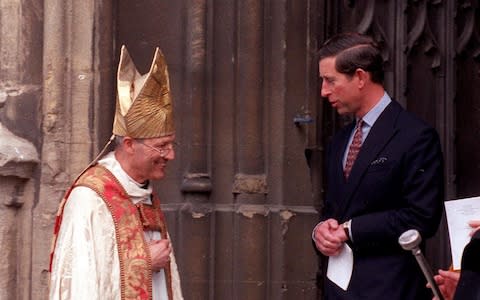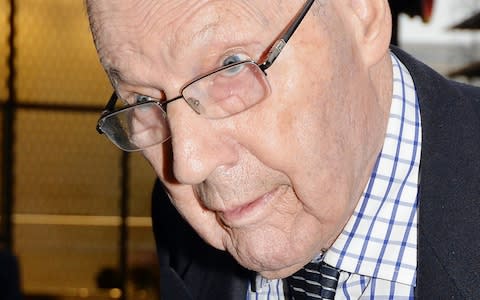Jonathan Fletcher: son of a cabinet minister, village vicar, 'gifted preacher' and ‘acquaintance’ of abusive QC

WHO IS JONATHAN FLETCHER?
The son of a former cabinet minister, a village vicar, and the ‘acquaintance’ of a QC who had a predilection for beating young boys.
Jonathan Fletcher, 77, is a man of many hats. However, since he was expelled from the community of the Wimbledon church where he used to minister earlier this year - the place which had cemented his reputation as one of the Church of England’s leading evangelical preachers - his fall from grace has been one of the most shocking within the establishment.
EDUCATION AND ESTABLISHMENT
Born in 1942 to Lord Eric Fletcher, a Labour politician who served in Prime Minister Harold Wilson’s first government, Jonathan Fletcher was well-accustomed to mixing with the upper echelons of society.
However it was not just the political elite which was familiar to Mr Fletcher, he was also revered
for his ferocious intelligence, “magnetic” personality and charisma. Such attributes were bolstered by his prestigious education at Repton School, which was also attended by Roald Dahl, and which has current annual boarding fees of around £35,000. All this, combined with his enthusiasm in mentoring young trainee ministers, ensured his reputation as a “gifted preacher”.

As a young man, Mr Fletcher went on to study at Hertford College at the University of Oxford where he received a BA in 1966. He later returned to the university to continue his studies at Wycliffe Hall, an Anglican theological training college.
In subsequent years he would serve in a governor-like role on the council for Wycliffe Hall, helping to ensure it ran smoothly in selecting staff and managing budgets. Until 2013 he was a director of Stowe School, a selective independent school with more than a dozen boarding houses.
Following his graduation, Mr Fletcher continued to mix in privileged circles throughout his adult life. In 1983 he became a member of ‘Nobody’s Friends’ – the High Church private dining club for senior clerical and lay leaders which meets at Lambeth Palace, the home of the Archbishop of Canterbury.
The club was founded in 1800 and over the years its membership has been comprised of many bishops, archbishops, headmasters of top schools, church lawyers, Tory peers, Admiralty and judicial figures as well as leaders of the House of Lords.
Nobody’s Friends has been criticised for facilitating a powerful ‘old-boys’’ network. Peter Ball, a former Anglican Bishop who was feted by Margaret Thatcher and friends with Prince Charles, was also a member.

Ball died aged 87 this summer. Prior to his spectacular downfall he was one of the Church of England’s most revered public figures. He was also the first Anglican bishop to be sent to prison since 1688, when King James II committed seven bishops to the Tower for their opposition to his Declaration of Indulgence.

His victims, many of them teenage boys, described approaching him for spiritual guidance and being asked to strip naked, take cold showers while he watched, masturbate him, submit to beatings, or sleep naked with him.
Last year the Independent Inquiry into Child Sexual Abuse (IICSA) turned its attention to the diocese of Chichester, where abuse had been widespread. Due to the disgraced bishop’s influential and powerful connections, Ball’s case has been accused of being dealt special treatment and required the presence of multiple witnesses to answer the charge of a cover-up at the IICSA hearings.

RELIGIOUS LIFE
Mr Fletcher was the vicar at Emmanuel church in Wimbledon, southwest London, for 30 years from 1982 until 2012, which is where current allegations of spiritual abuse were levelled against him.
Prior to that he had also ministered at other high-profile churches including St Helens Bishopsgate and at the Church of the Holy Sepulchre, Cambridge, which is more commonly known as The Round Church and is the city’s second oldest building. Today, as when Rev’d Fletcher served there, it is a church that attracts many young students.
However Mr Fletcher also held a myriad of other responsibilities and links in conservative evangelical circles in the UK, such as that with the Iwerne camps (the ministry of which was taken over, in 1997, by its successor organisation ‘The Titus Trust’).
Mr Fletcher attended the camps from the age of 14, in 1956 – and went on to become a regular speaker and dorm leader. Iwerne was led by his brother David, who was also the minister of St. Ebbes’ Church, Oxford.
One of the most powerful conservative groups within the Church of England is ‘ReNew’ - the brainchild of Rev. William Taylor of St. Helens, Bishopsgate. ReNew grew out of a merger of ‘Church Society’ and ‘Reform’
The former society is an evangelical Anglican organisation aiming “to reform and renew the Church of England in biblical faith” and regularly published materials promoting Mr Fletcher’s vision for the Church. The latter held Mr Fletcher as a trustee and senior leader.
Mr Fletcher was also a co-founder of the Proclamation Trust, a charity which has trained many ministers now serving within the Church and has hosted lectures and apprenticeships for students. The former vicar often had the young apprentices living with him while serving at his church.
The conservative movement has led the opposition to the ministry of women and homosexuals within
the Church. For decades, Mr Fletcher has been at the heart of its senior leadership.
Yet it is the Iwerne Christian summer camps where it is claimed that he first met some of his alleged victims. Both Fletcher brothers were well known to participants and would regularly frequent the religious camps.
ALLEGED LINKS TO SMYTH
Jonathan Smyth QC was chair of the Iwerne Trust, which ran the summer camps, during the 1970s and 80s. Smyth was later accused of subjecting young boys to vicious sadomasochistic beatings. However, he died of a heart attack aged 77 in August 2018.
The part-time judge and Church of England lay reader was due to be extradited to the UK from his home in Cape Town to be interviewed by Hampshire police about the allegations that he had administered beatings to boys at his home. The force opened an investigation in 2017 into the claims following an exposé by Channel 4 News.
The Iwerne Trust invited boys and young men from public schools and top universities to attend holiday camps, which aimed to ensure that future generations of the establishment were committed Christians.
A then unpublished report commissioned by the Iwerne Trust in 1982 described Smyth’s “horrific” beatings of teenage boys. However, even then, he was not reported to the police. The report was commissioned by Jonathan Fletcher’s brother, Rev’d David Fletcher.

Smyth moved to Zimbabwe in 1984, after allegations emerged that he had beaten 22 young men in his garden shed in Winchester, having persuaded them it would help purge them of their sins. The anti-gay campaigner had handed out up to 800 lashes to numerous males, some so severe the victims were left bleeding.
It was not until 2017 when the allegations of abuse emerged.
Smyth later relocated to Cape Town. Six months before his death, he was removed as a leader of his local church following claims of inappropriate behaviour and a “heavy-handed style of leadership”.
Also present at the Iwerne Camps was the current Archbishop of Canterbury, the Most Rev Justin Welby, who worked as a ‘dormitory officer’.
After the allegations against Smyth emerged, at the time, the Archbishop said he had been “completely unaware” of any abuse by Smyth when he worked at the camps, and that he first knew of the allegations in 2013.
He recalled Smyth as “a charming, delightful, very clever, brilliant speaker”, but said he “wasn’t in his inner circle”. He also issued an “unreserved and unequivocal” apology on behalf of the Church of England, admitting that it had “failed terribly” to tackle institutional abuse.
Another abuser at the Iwerne camps is known to have been the deceased Simon Doggart. He went on to be headmaster of Caldicott preparatory school in Buckinghamshire. Mr Fletcher attended his funeral.
THE JONATHAN FLETCHER SCANDAL
This summer The Telegraph unmasked Jonathan Fletcher as the leading Church minister who had been banned from preaching following allegations of abuse.
In 2017 he was stripped of his Church preaching powers by the Bishop of Southwark after complaints were made to Emmanuel Church. Rev’d Vaughan Roberts, director of the Proclamation Trust, responded by sharing some information about Mr Fletcher’s activities, at the organisation's annual conference for ministers. Mr Roberts was himself a leader on the Iwerne/Titus Trust camps, and leads the church previously run by Rev’d David Fletcher.
However despite having his permission to officiate (PTO) - a Church licence to practice - revoked two-years-ago, this newspaper revealed that Mr Fletcher had continued to travel around the world giving sermons.
He had repeatedly flouted his preaching ban to speak around the world and travelled throughout the UK, Europe and New Zealand giving talks.
Southwark Diocese confirmed that the allegations centred around a “risk of him behaving towards vulnerable adults who may be seeking his spiritual guidance in a manner which may be harmful”.
He later admitted subjecting a prayer group to naked beatings as “light-hearted forfeits” if they failed to maintain “healthy and holy living”in a “system of mutual encouragement”.
Mr Fletcher’s alleged victims claim that such beatings are reminiscent of those which Smyth administered to his young victims. Following The Telegraph’s revelations in June that Jonathan Fletcher had been spiritually abusing vulnerable adults, he told this newspaper that Smyth was “an acquaintance”.
Yet now he faces allegations of “similarities” with this acquaintance; not only did he abuse his position of trust, but also engaged in beatings and spiritual abuse.
Mr Fletcher retired as a minister before allegations were lodged against him five years later, triggering a police investigation.
Since complaints were made in 2017, the Church has received further allegations against Mr Fletcher in September 2018. Again officers concluded that a police investigation was not required.
After the allegations emerged, Mr Fletcher was asked and agreed to withdraw from all aspects of his ministry and urged to not attend his former church.
Today The Telegraph has published the first interviews with his alleged victims who claim they were subjected to repeated sexually inappropriate comments and questions about masturbation, intimate massages, beatings, ice baths, bullying and intimidation over a number of years. Mr Fletcher has said he is “deeply, deeply sorry for anybody that I have hurt or harmed in any way,'' adding that “anything that happened was totally consensual and non-sexual”
INDEPENDENT REVIEW
Earlier this month, Thirtyone: eight, the UK’s only independent Christian safeguarding charity, announced a review concerning Jonathan Fletcher and Emmanuel Church.
The church commissioned the independent project, which is expected to report findings by May 2020.
“The review will enable the voices of those impacted by the behaviour of Jonathan Fletcher to be expressed, heard and considered alongside other contextual information and concerns from other relevant sources,” a spokesman said.
After the allegations against Mr Fletcher emerged this summer, the church asked victims to come forward and share their testimonies. It is understood that these will now be passed to the charity for inclusion in its review. It is expected to be published by May 2020.

